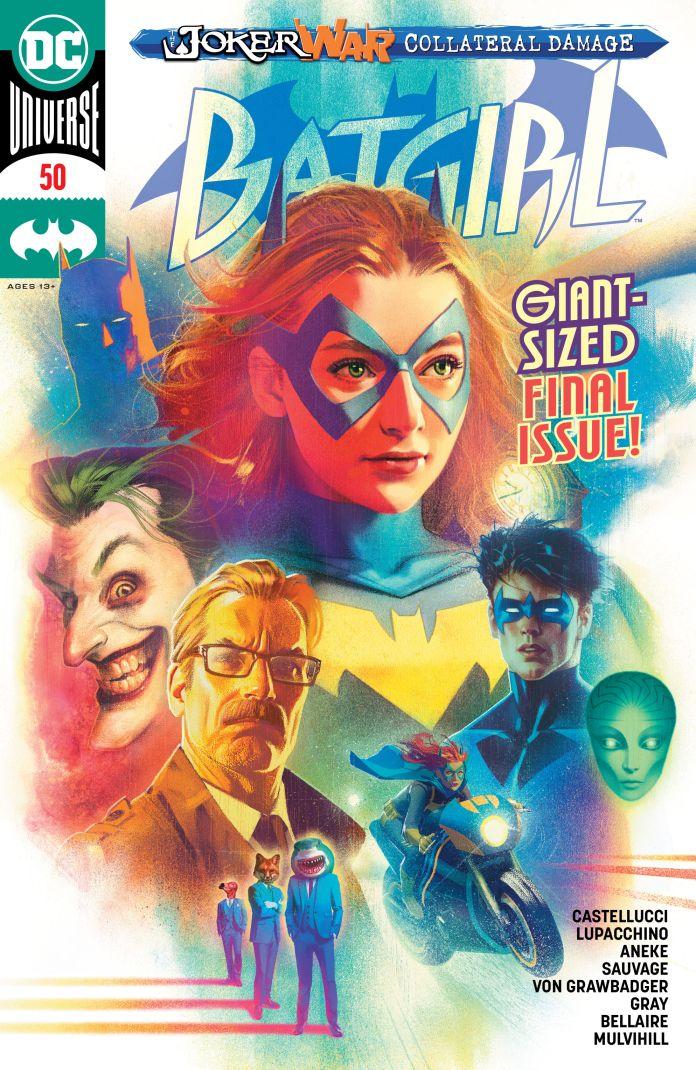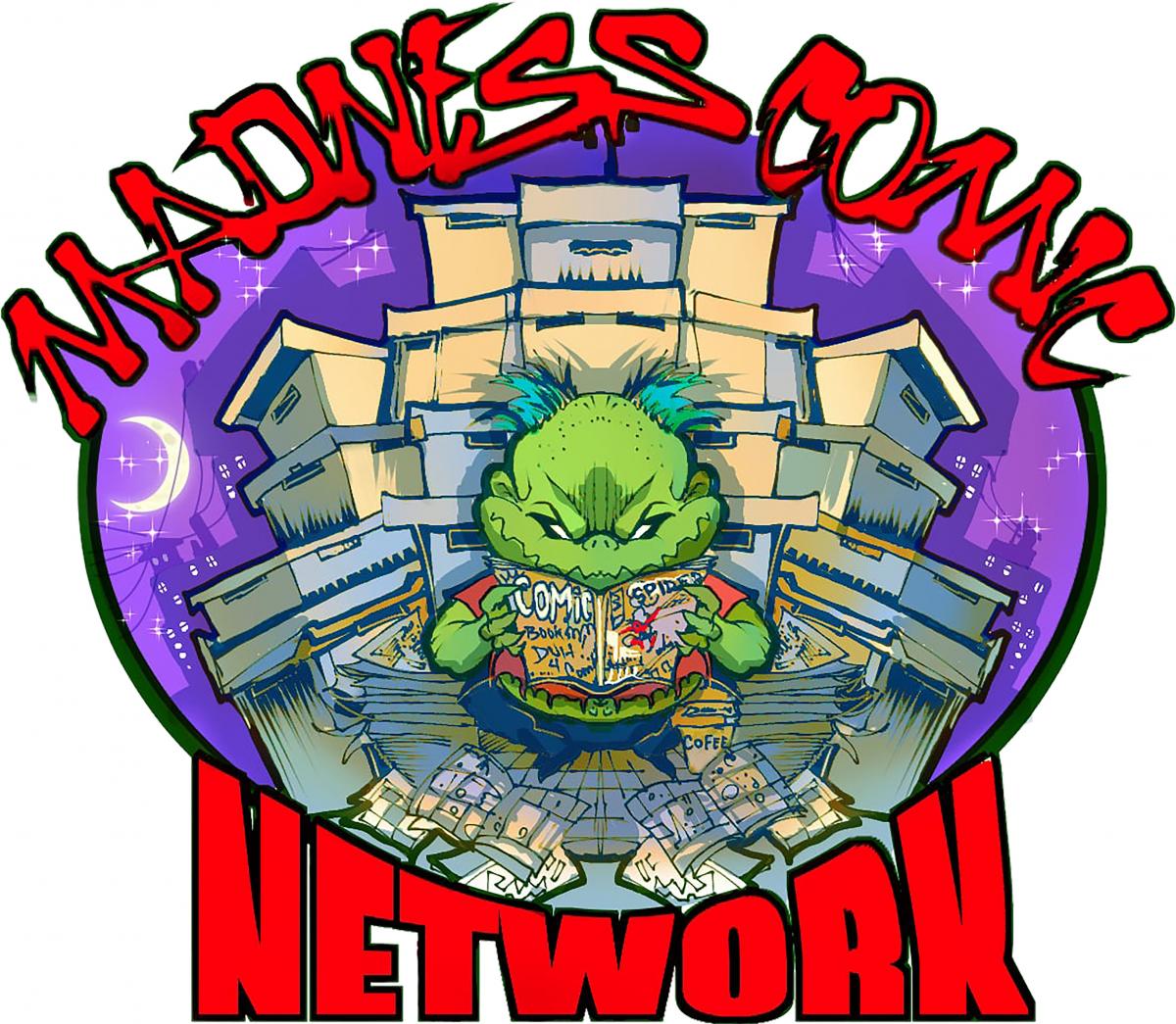Unreadable Mess: Batgirl #50 Ends Run Minus Gratefulness and Grace
FTC Statement: Reviewers are frequently provided by the publisher/production company with a copy of the material being reviewed.The opinions published are solely those of the respective reviewers and may not reflect the opinions of CriticalBlast.com or its management.
As an Amazon Associate, we earn from qualifying purchases. (This is a legal requirement, as apparently some sites advertise for Amazon for free. Yes, that's sarcasm.)

There's a lot to unpack here, so get comfortable. You may want to order in, have a drink ready. Maybe even go pee first. But the tl'dr of this review is this: Cecil Castellucci sent Batgirl out on a self-centered, narcisisstic, self-aggrandizing, self-righteous, holier-than-thou, solipsistic whimper of a comic book that was less written than it was defecated.
So let's start with the first story of this terrible trio, "Little Wonders" with art from Emanuela Lupacchino with inks from Wade Von Grawbadger, Mick Gray, and Scott Hanna. As you can surmise, the art style is going to shift throughout this tale due to the amount of cooks in the kitchen. It shows as we go from scene to scene, following Barbara from the graveyard with her father, to the Batcave with the Bats, to the streets of Gotham that are in chaos.
In this story -- and in every story in this Giant-Sized Final (Thank God) Issue -- Castellucci manages to present Barbara Gordon as the most distasteful human being in all of comics existence. She's just come from shoveling dirt onto her brother's grave, with her father by her side, and she's just not all that broken up about it. (Then again, neither am I, since I was at his funeral not five years ago, when Batgirl killed her brother the last time.) James Gordon naturally has a lot on his mind and is in a depressed state -- he also isn't all that please with Batgirl, nor with the chaos in the streets in the aftermath of Joker War. Barbara's response to him is to tell him to shut up, slam down her milkshake, and walk out of the diner where they were supposed to have a nice memory -- her own idea, again, literally after leaving the funeral service.
She then proceeds to find new heroes in the Antifa crowd pulling down statues, and joining hands with protesters who get chased by police. "I want to help Gotham be better," she tells one of the disenfranchised. This is the setup that leads us to meet Ryan Wilder for the first time, as the changes on the BATWOMAN television show must now be echoed in the comics universe. This is the only thing truly selling this book is the hope that the new Batwoman is going to take off and this 1st appearance may pull a Punchline over time. Barbara's interaction with Ryan reminds her to make a mental note to talk to the congresswoman she works for, to remind her about the homeless crisis and voter registration. Because that's what Gotham needs to recover from being razed to the ground by The Joker. When she sits down for dinner with Jason Bard later, she compares the street protests to the same activities of Batgirl. He asks if they can't write an email or make calls to the proper authorities instead of, you know, looting and pillaging, and she chides him that "It's actually our job to listen, Jason."
Two more pages of "I know" and "I'm sorry" later, Jason is thankfully rescued from this miserable meal by Barbara's pager -- a bat-alert calling her to the Batcave. But there's no emergency. It's just a status meeting, where Batman reminds them all how the Joker burned through all his cash so now he's no longer a billionaire, just a millionaire. Babs is miffed to discover that Dick and Tim are actually getting monthly funding to do their work, then proceeds to lecture Batman about not giving enough money to the people of Gotham, even after he ticks off a number of charities he does support. Oh, but they're the wrong charities, because he should support this thing that she believes in -- and before she can finish her sermon, he presses a button and it's done.
"Thank you, Bruce." Oh wait, no, she doesn't say that, because you don't thank people for doing what they should have done without you reminding them to do it. Instead, she storms off, lecturing Dick about the way he treated her when he was brainwashed by the Joker. Their relationship now is "strictly professional" because "Ive got my own life to lead." And thus we toss out years of relationship history, because Barbara's on a social awareness tear.
This leads into a hodgepodge of Batgirl and/or Barbara interventions -- stopping jumpers, helping little old ladies carry groceries, teaching self defense, telling police officers she "expects to see them" get their flue shot at the health fair Congressman Alejo is holding, etc. It's an overall "I have no lessons to learn, I have no questions to ask, you all have something to learn from me." And it's not even over.
No, because now we go to Congresswoman Alejo's office, where Barbara works ostensibly as the power behind the throne. The congresswoman is upset because the police are holding a "thousand dollar a plate" fundraising dinner, and Alejo is going so that she can work within the system. But Barbara -- after issuing a protester a permit to stop traffic on a two-block stretch (see, she's also doing City Hall's job -- she's a very powerful person) convinces Alejo that she shouldn't go support the cops but rather she should be with the people who are marching in the streets (and throwing rocks through windows). Barbara even convinces Jason -- who walks with a cane -- to join in the march. "All right. I hear you. I trust you. And I've got your back." Validation all the way, Jason. You're gonna get some tonight!
Only two more stories to go. We can make it.
"Stay Centered" is drawn by Marguerite Sauvage, and it is some absolutely gorgeous work. It's a shame it's marred by the tale it has to tell. In the DC Universe, Batgirl is that rare breed: a Mary Sue who is simultaneously a Back-Burner Betty. Her day is a series of constant interruptions, with Saint Barbara, who will "become wht athey need: a different Batgirl every time." Because whenever Green Arrow or The Flash have a problem, Batgirl is who they call, not Batman. Nightwing I could see, as he's had a long-standing relationship with Batgirl. But Dick Grayson would never say "Stay back, Batgirl. I'd die if anything happened to you." At least not since 1966.
It's not just individual heroes, either. It's entire teams who need her. The JLA calls her in to help with an alien invasion, only to tell her she can take off because Supergirl showed up. Supergirl, being a good fellow female, is perfectly willing to give the fight to Babs if she wants it, but no, it's all yours Supergirl, as Batgirl walks away from the Hall of Justice checking her Twitter feed, while Supergirl doesn't even spill her Starbucks as alien concussive blasts go off about her. This is how battles are fought in Cecil Castellucci's DC Universe -- by committee. As the battle goes on behind Batgirl, she is happy to dismiss it as "not my problem; I can get back to what's important to me in my life."
Narcissism. It's an ugly trait in a superhero. The aliens should count themselves lucky, though. Supergirl might not lecture them after defeat about how they should "be better."
Not only does every DC hero need Batgirl's assistance, they also disregard her. As Batgirl notices someone tagging attacked areas -- she gets a new virus-attacking foe called Vi Ross; Gardner Fox would have thrown that idea out the window, and he gave us Ira Quimby and T.O. Morrow -- she tries to bring it to the attention of her different partners, who treat her like "a woman." "Stay focused," says Man-Bat. "Never mind that. You have to help me," says Flash. "One thing at a time," says Green Lantern.. Then, as she finds Vi Ross infecting -- how timely -- voting machines, she leaves Green Lantern in the lurch to pursue her own story, blowing off Robin who "needs" her because "Riddler is on the loose." But Batgirl has her own enemy now, so manage without her for a while, Boy Wonder.
As Batgirl fights Virus -- who's not just good at computer viruses, she also has the biological kind all stored up. And of course during the fight the entire DC pantheon of heroes is in a tizzy because they don't know where Batgirl is or why she's not returning their calls for help.
Just one more. It's bound to get better, right?
"Game Night" is drawn by Aneke and colored by Trish Mulvihill. There's hope here, because it's a gathering at Barbara's apartment of Huntress, Black Canary, Orphan and Spoiler -- all in their civilian guises. They're there to play a dragon-and-magic-based role playing game. They're playing characters against their natural types, as a learning experience. But when "something goes down at the wharf" (they all get this alert, but there's no indication of who actually sent the message, as there are no police cars at the wharf when they arrive), Barbara sends them out together as a team, while she coordinates from home as Oracle once again. It's a rescue mission, because what's happening here is the human trafficking of very young girls, a very dark and serious matter.
But Barbara sees this as an opportunity for change -- she wants change in herself, so she must imagine first a change in her world. To that end, she directs the team to stay in character to their roleplaying game. She challenges them not to use their own natural abilities, but to use the traits given to their fictional game characters.
Hey, it's not like the lives of children are at stake or anything. Besides, no price is too great to satisfy the growing ego of a character I've loved for forty-five years. Barbara must be validated, so the world must conform and comply.
After reading these three stories, all I can hope for is that the new BATWOMAN television series sparks some interest in this issue on eBay, so I can flip it quick -- and flip it off, giving it the same F-you that Castellucci has given Batgirl fans the world over.


